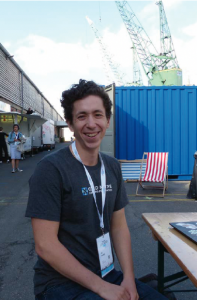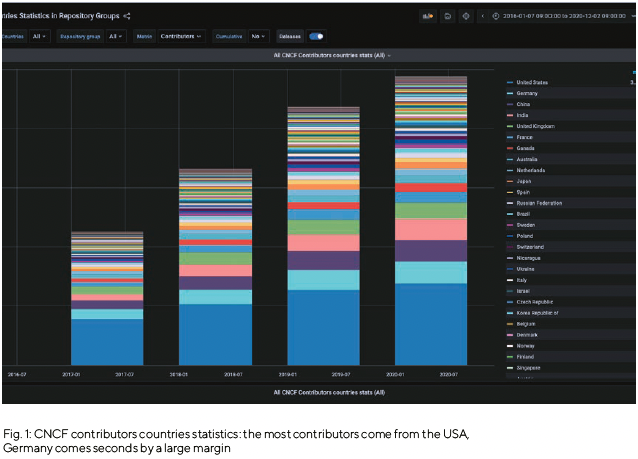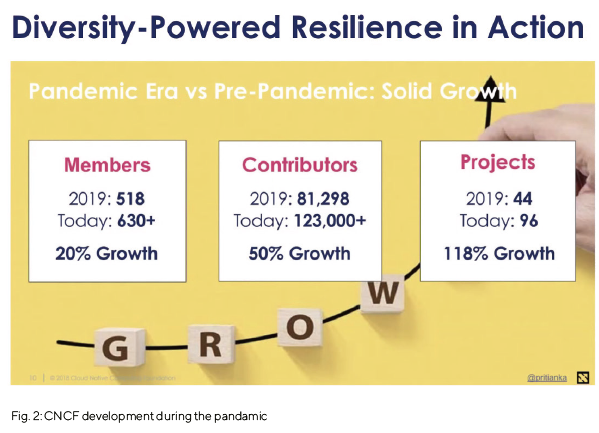– the Maturity of CNCF
At the Container Days 2021 in Hamburg I had the pleasure of meeting Bill Mulligan from CNCF* in person and we talked about the three p’s of CNCF (projects, places, people), Kubernetes, and how CNCF is growing.

Hi, I´m Bill Mulligan and I work at the Cloud Native Computing Foundation, which is a sub-foundation of the Linux Foundation. I´m here to meet people in the container space, smart colleagues in a great location, so this is a conference I couldn’t miss.
It is so great to meet people in person! And what news did you bring from CNCF?
My talk here was about “Building for the next 100,000 Contributors.” CNCF is now 6 years old, and the question is, how we can achieve the transition from being a toddler to moving into adulthood. What do we need to focus on next to continue growing and expanding the cloud native community? We want to continue to advance cloud native technology innovation and expand access to the tools. The big things that we focus on at CNCF are the projects, the places, and the people.
The biggest thing concerning the projects, where all the energy and excitement are going into, are the Sandbox projects. There are now about 70 projects in the Sandbox. These projects are very diverse, spanning vertical solutions like high performance computing, edge computing, or machine learning and on the other hand moving up the stack, so, evolving hardware and operating systems, and of course Kubernetes, which becomes standardized for developer experience and things like that.
The second focus is expanding to more geographical places. CNCF at the whole isn´t as diverse as the Linux Foundation in terms of members and contributors (fig. 1). So, I think it would be great, if we continue to expand. That´s why I´m excited to be here in Germany, it has the second or third largest community of CNCF contributors, which is awesome! I know, having worked in Germany my whole career, there are a lot of awesome engaging people here and we have the opportunity to develop the community even more here, in Europe and across the world. We organized the first Kubernetes Community Day Africa earlier this year which was another exciting thing! The whole KCD program is cool, it is bringing cloud native to a lot of places where it hasn´t gone before. And it is in the regional language: in Korea it is in Korean and so on. So, we are bringing cloud native all around the world.

The third part are the people and finding and creating sustainable pathways to bring contributors into the community and onboard them. There are a lot of things we can do like bringing students into our community to build a solid foundation to continue supporting the speedy cloud native, Kubernetes world. We understand the need to create sustainable pipelines that lead people into the community. As we are going into year seven, a lot of challenges, but also fun is ahead.
During the pandemic the topics of diversity and resilience became more and more important for the community. How is CNCF thinking about this?
Absolutely. One thing that Priyanka Sharma, General Manager of the CNCF, always says is: cloud native is powered by its diversity powered resilience (fig. 2). That has led the focus on strengthening our diversity, which really is the cornerstone of the cloud native community. It is a welcoming and inclusive environment. And we try to design everything we do with that in mind, i.e., our events teams does a lot of things to make our events accessible and welcoming to different people around the world, whatever their situation is or whatever needs they have.

I´m excited that we now have hybrid events because it provides accessibility to a lot more people. As we saw with the recent current events, people who can´t attend in person for a lot of different reasons, can join the events virtually. And I´m happy that we are able to do that! Like here at the Container Days, we are here in person, but they also have over 1000 people following online. CNCF also provides for diversity and needbased scholarships, and at the last KubeCon we had over 1000 students attending the event on scholarships, and I think at the next there will probably be more. We have spent a lot of energy expanding the student community and we are thrilled to bring in young people with their energy and excitement for the next generation of cloud native development, and technology. The community is always changing, so to create a sustainable community and ecosystem you always need the influx of new people who always feel welcome and included. There are a lot of great initiatives at CNCF that ensure it is a welcoming and inclusive environment.
You speak from my heart, it is so important to include everyone with a good idea and passion for technology without judging.
Yes, we are also able to address the gap of opportunities around the world, by creating opportunities that are not tied to a geographic location. That´s one of the great things about the internet, and open source communities – these things really expand opportunities in a way that wasn´t available to a lot of people before. And now anybody can start contributing wherever they are from. That is a really powerful thing.
There is nothing to add. So, I’ll change the topic. Kubernetes is one of the biggest projects within the CNCF – or even the largest – how is it being further developed? What is new?
One of the biggest changes is the release cycle, which is now three times a year, not four, which is a testament to the maturity of the project. They are slowing down and making more deliberate changes. In a project there is never everything fully done, but a lot of the big features and the core are there, and now it´s about making it rock solid and even better. I know there are rumors that Kubernetes should have a long-term release, but there are also voices voting for the shorter cycles, let´s see where that goes.
Interesting are the developments within Kubernetes concerning the edge computing use cases, which are of big interest, especially here in Germany around automotive and manufacturing companies, but also for the midmarket segment, the German “Mittelstand”. Edge computing is not specifically under Kubernetes, but there are four or five different projects within CNCF that are focused on bringing Kubernetes to the edge. Overall: the CNCF is growing every single week. We just added five more Sandbox projects last week. Sometimes it is a little bit scary, but it is really cool and exciting.
And that shows that so many people are contributing and interested in all the cloud native stuff CNCF is doing. Great. Thank you for your time, it was a pleasure to meet you.
- Please note – Bill Mulligan has left CNCF to pursue other opportunities.
The interview was conducted by Friederike Zelke
